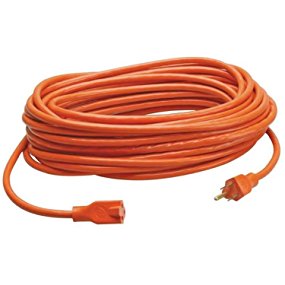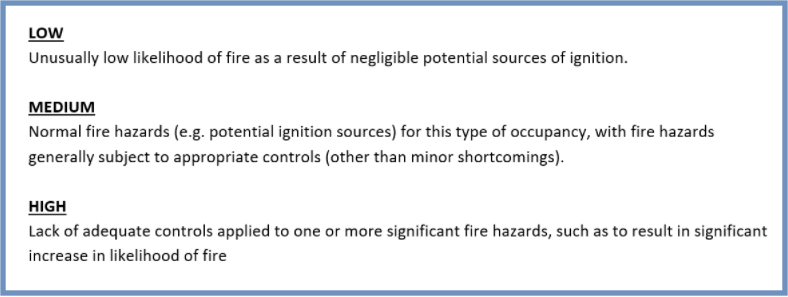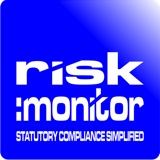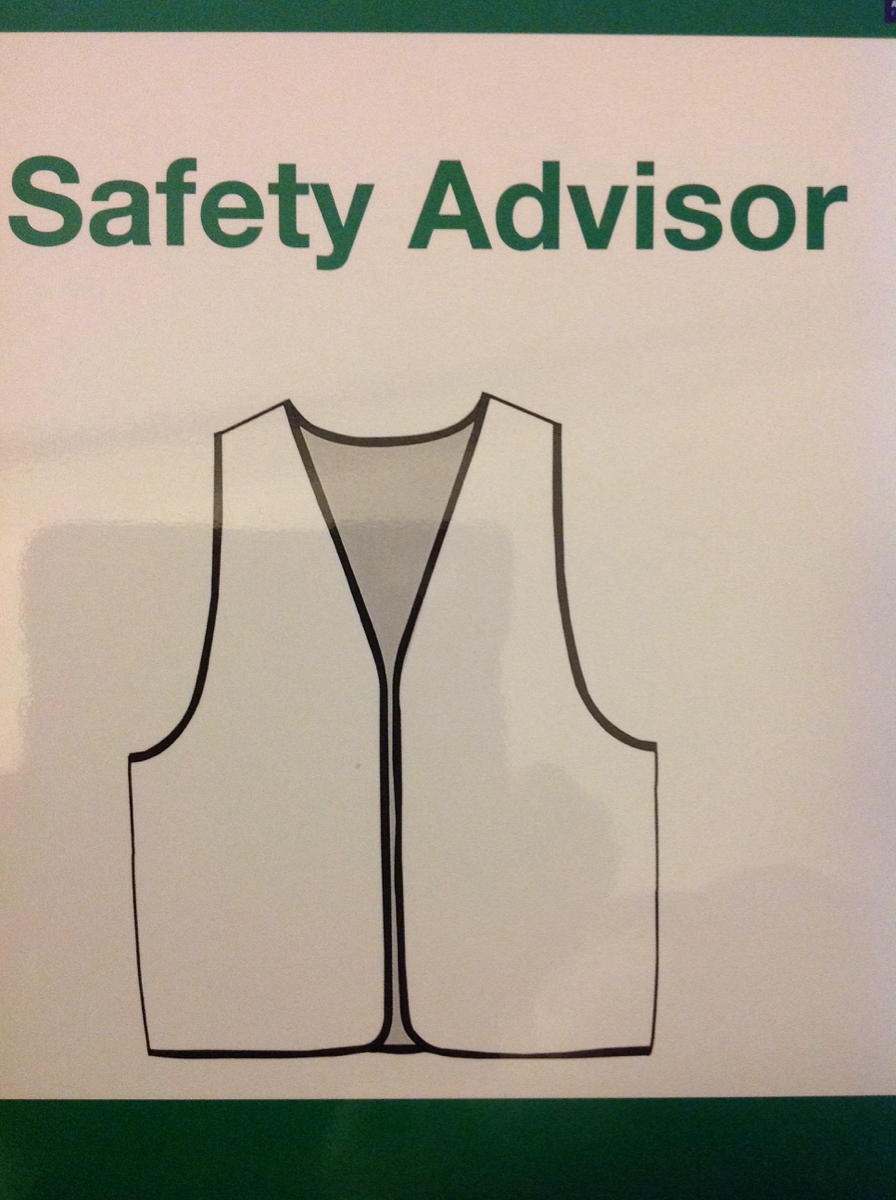Title Page
-
Air Spectrum
-
SIte Location
-
Full Address
-
Fire Safety Officer
-
Prepared by
-
Date of Previous Fire Risk Assessment
-
Date of Fire Risk Assessment
-
Suggested Date for Review
Information
GENERAL INFORMATION
-
The Premises
-
Number of Floors
-
Brief details about the construction
-
Use of the premises
-
The Occupants
-
Approximate maximum number
-
Number of Sleeping Occupants
-
Number of Disabled Occupants
-
Number of Minor Occupants
-
Others
Hazard and Risk Identification
HAZARD AND RISK FACTORS
-
What are the factors present in the inspected area? You may choose multiple items. *You may also add photos, notes, and actions by clicking the paperclip icon.
- Smoking
- Cooking
- Electrical
- Portable Heaters
- Use of Candles
- Deliberate Ignition
- Alcohol or Drug Use
- Hoarding (Access)
- Oxygen
- Sensory Impairment
- Arson
- Housekeeping
- Dangerous Substances
- Other factors
Smoking
-
Select a circumstance observed
-
Are there more details observed?
Detail
-
Please provide further information here
Cooking
-
Select a circumstance observed
- No evidence or suggestion of careless behavior
- Has evidence or suggestion of careless behavior
-
Inappropriate use of cooking equipment (e.g. microwave ovens).
-
May occasionally leave cooking unattended.
-
Likely to leave cooking unattended.
-
History of alarm signals or small fires from cooking.
-
Are there more details observed?
Detail
-
Please provide further information here
Electrical
-
Including equipment and extensive use of extension leads and adapters and/or electric blankets
-
Select a circumstance observed
-
Cube adapters used
-
Potential overloading of circuits
-
Worn equipment or cables
-
REFERENCE: Extension cables in good working condition
[This is an example of how you can use iAuditor to include best practice reference images in your templates to assist with inspections] -
Electric blankets not maintained regularly
-
Are there more details observed?
Detail
-
Please provide further information here
Portable Heaters
-
Select a circumstance observed
- Compliant with modern standards (oil filled radiators or convector)
- Higher hazard (fan heaters, radiant bar fires)
-
Evidence of heaters sited too close to combustible materials
-
Likelihood of heaters sited too close to combustible materials
-
Potential for other careless use (e.g. drying clothes, warming meals, etc.)
-
Are there more details observed?
Detail
-
Please provide further information here
Use of Candles
-
Select a circumstance observed
- Used with appropriate precautions
- Used without appropriate precautions
-
List further details of the current circumstance
Detail
-
Please provide information here
Deliberate Ignition
-
Select a circumstance observed
- No history or likely potential
- No history but has some potential
- Has history or potential
-
List further details of the current circumstance
-
Previous history of deliberate ignition
-
History of malicious false alarms to the fire and rescue service
-
Are there more details observed?
Detail
-
Please provide further information here
Alcohol or Drug Use
-
Select a circumstance observed
- Without high fire risk behavior
- With high fire risk behavior
-
Evidence or likelihood of careless handling of smoking materials
-
Evidence or likelihood of leaving cooking unattended
-
Are there more details observed?
Detail
-
Please provide further information here
Hoarding (access)
-
Select a circumstance observed
- No hoarding, or hoarding of generally non-combustible materials that do not obstruct escape routes
- Hoarding between clutter levels 1 and 413
-
Hoarding confined to a single room
-
Hoarding in more than one room
-
Hoarding within escape route
-
List the types of materials hoarded
Material
-
Please specify
Oxygen
-
Use of oxygen combined with high fire risk behavior
-
Are there other details observed?
Detail
-
Provide further information here
Sensory Impairment
-
Select a circumstance observed
- Hard of hearing, or partially sighted
- Deaf or blind
-
Please specify further details observed
Detail
-
Provide information here
Arson
-
Select a circumstance observed
-
Are there fire loads in close proximity from the premise?
-
Are there more details observed?
Detail
-
Provide further information here
Housekeeping
-
Select a circumstance observed
-
Combustible materials appear to be unseparated from ignition sources
-
No appropriate storage of hazardous materials
-
Inappropriate storage of Combustible materials
-
Are there more details observed?
Detail
-
Provide further information here
Dangerous Substances
-
Select a circumstance observed
- Stored and used with precaution
- Not stored properly
-
List observations
Other Factors
-
Please list factors not mentioned above and provide further details to each.
Risk Factor
-
State them here
Fire Protection Measures
FIRE PROTECTION MEASURES
-
1. Means of Escape from Fire
-
It is considered that the premises are provided with reasonable means of escape in case of fire
-
Has adequate design of escape routes?
-
Has adequate provision of exits?
-
Exits easily and immediately openable where necessary?
-
Fire exits open in direction of escape where necessary?
-
Satisfactory means for securing exits?
-
Has alternative means of escape?
-
Escape routes unobstructed?
-
2. Emergency Escape Lighting
-
Has reasonable standard of emergency escape lighting provided?
-
Fire Safety Signs and Notices
-
Has reasonable standard of fire safety signs and notices?
-
3. Means of Giving Warning in case of Fire
-
Has reasonable manually operated electrical fire alarm system provided?
-
Has automatic fire detection provided?
-
4. Manual Fire Extinguishing Appliances
-
Has reasonable provision of portable fire extinguishers?
-
Hose reels provided?
-
Are all fire extinguishing appliances readily accessible?
-
5. Procedures and Arrangements
-
Are procedures in the event of fire appropriate and properly documented?
-
Are there suitable arrangements for Summoning the fire and rescue service?
-
Are there suitable arrangements to meet provide relevant information, including that related to hazards to firefighters?
-
Are there suitable arrangements for ensuring that the premises have been evacuated?
-
Is there a suitable fire assembly point(s)?
-
Persons nominated and trained to use fire extinguishing appliances?
-
Persons nominated and trained to assist with evacuation, including the evacuation of disabled people?
-
6. Training and Drills
-
Are all staff/members given adequate fire safety instruction and training?
-
Which of these items do the members or staff knowledgeable about? You may select multiple items.
- Fire risks
- Fire safety measures
- Action in the event of a fire
- Action on hearing the fire alarm signal
- Method of operation of manual call points
- Location and use of fire extinguishers
- Means for summoning the fire and rescue service
- Identity of persons nominated to assist with evacuation
- Fire drills
-
7. Testing and Maintenance
-
Has adequate maintenance of premises?
-
Has weekly testing and periodic servicing of fire detection and alarm system?
-
Has monthly and annual testing routines for emergency escape lighting?
-
Has annual maintenance of fire extinguishing appliances?
-
Has periodic inspection of external escape staircases and gangways?
-
Has weekly and monthly testing, six monthly inspections and annual testing of firefighting lifts?
-
Has weekly testing and periodic inspection of sprinkler installations?
-
Has routine checks of final exit doors and/or security fastenings?
-
Has annual inspection and testing of lightning protection system?
-
8. Records
Appropriate records of: -
Fire drills?
-
Fire training?
-
Fire alarm tests?
-
Emergency escape lighting tests?
-
Maintenance and testing of other fire protection Systems?
Overall Assessment
-
The following simple fire risk level estimator is based on a commonly used health and safety risk level estimator.
-
-
DEFINITION OF TERMS (Risk from Fire)
-
-
Taking into account the fire prevention measures observed at the time of this risk assessment, it is considered that the risk from fire (likelihood of fire) at these premises is:
-
DEFINITION OF TERMS (Risk Assessment)
-
-
Taking into account the nature of the premises and the occupants, as well as the fire protection and procedural arrangements observed at the time of this fire risk assessment, it is considered that the consequences for life safety in the event of fire would be:
-
DEFINITION OF TERMS (Risk Level)
-
-
Accordingly, it is considered that the risk to life from fire at these premises is:
COMPLETION
-
Name of Responsible Person and Signature
-
Assessor's Name and Signature
















